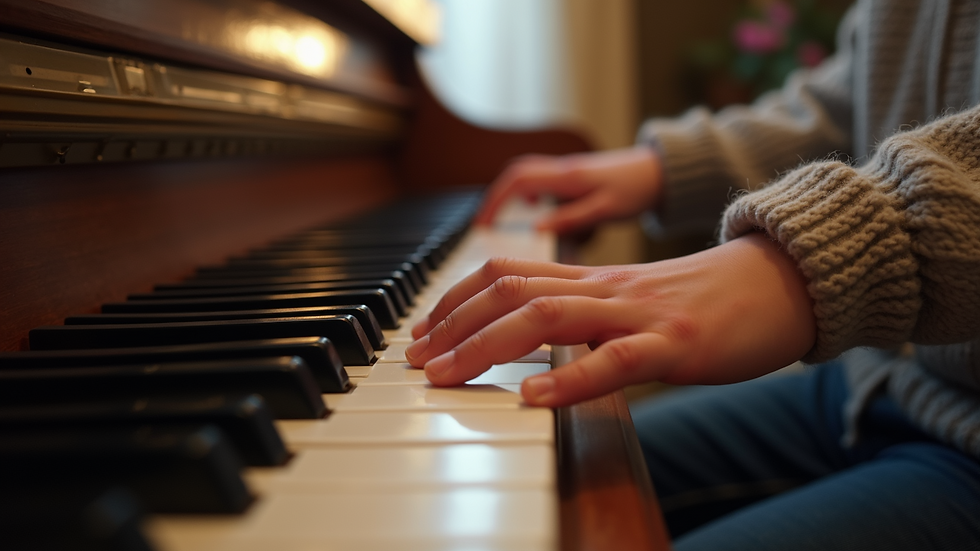Discovering the Beauty of Classical Piano Music
- Inna Leoni Holly

- Jul 8, 2025
- 4 min read
Piano music has a unique ability to evoke emotions and transport listeners to different realms. Classical piano music, in particular, stands out with its intricate compositions, rich history, and profound ability to connect with audiences. Whether you are a seasoned pianist or a curious listener, the journey through this genre offers endless surprises and deep satisfaction.
The Allure of Piano Music Exploration
Classical piano music captivates us with its wide range of expressions, from serene to dramatic. Composers such as Beethoven, Chopin, and Liszt created masterpieces that continue to resonate. Their works showcase complex harmonies and touching melodies that tell stories unlike anything else.
When exploring piano music, you can discover various styles and eras. From the Baroque period's structured elements to Romantic music's emotional depth, every era has something unique to offer. Listening to these pieces can inspire you to learn more or even take up playing the piano yourself.

Understanding the Rich History of Classical Piano Music
Classical music dates back several centuries and underwent many transformations. It began in the Medieval period and evolved through the Renaissance, Baroque, Classical, Romantic, and Modern periods. Each phase contributed to the development of the piano as we know it today.
During the Baroque period, composers like Johann Sebastian Bach utilized the harpsichord to create intricate polyphonic works. This era laid the groundwork for the expressive capabilities of the piano. The Classical era followed, marking the time of Haydn and Mozart, who focused on clarity and balance.
By the Romantic period, composers such as Chopin and Schumann began to explore deeper emotions. Their compositions highlight the piano's ability to convey more than just notes - they express feelings and stories that resonate with listeners on a personal level.

What is Considered a Classical Piano?
Understanding what constitutes classical piano music involves recognizing its elements. Classical piano music typically features:
Form and Structure: Compositions often adhere to traditional forms such as sonatas, concertos, and preludes. These structures provide a framework for displaying musical ideas.
Technique and Interpretation: Classical pieces demand specific techniques, varying from fast scales to delicate trills. Interpretation plays a crucial role, allowing musicians to bring their own emotions to the performance.
Notation and Enrichment: Classical pieces are written to specific notations, guiding the musician in dynamics and pacing. This approach enriches the performances, making them more engaging.
When exploring classical piano, it's essential to familiarize yourself with the music's technical aspects. These elements contribute to the artistry that makes classical piano music so powerful.

Embracing the Emotional Connection
One of the most striking aspects of classical piano music is its ability to create deep emotional connections. This instant transport to another world is a unique hallmark of the genre. Take, for instance, Chopin's Nocturnes. These pieces often evoke feelings of longing or nostalgia, drawing listeners into an intimate atmosphere.
Research shows that music can influence our emotions significantly. The tempo, dynamics, and tempo of classical piano music can elicit happiness, sadness, or even excitement. As one explores this genre, it becomes evident that each piece can provide a unique emotional experience.
To maximize this emotional connection, here are some recommendations:
Listen Actively: Instead of having music play in the background, focus fully on the piece. Notice the different emotions that emerge as the music unfolds.
Analyze the Compositions: Read about the background and story behind the pieces. Understanding a piece's historical context can deepen your appreciation.
Try Playing: If you have access to a piano, try playing a simple classical piece. Experiencing the music firsthand adds an extra layer of richness.
Finding Accessible Classical Piano Music
In today's digital world, accessing classical piano music is easier than ever. Here are a few helpful resources to discover delightful pieces:
YouTube: Many channels specialize in classical music, offering full performances and tutorials.
Streaming Services: Platforms like Spotify or Apple Music curate classical playlists, helping you explore new artists and genres.
Local Concerts: Attending live performances can provide an intimate experience with classical music. You might discover new favorites and enjoy the communal atmosphere of music appreciation.
Moreover, consider studying the works of both well-known and contemporary composers. Although famous pieces are essential, many modern composers are reviving classical traditions in innovative ways, enriching the art form.
The Journey of Learning Classical Piano
For those inspired to play classical piano music themselves, learning the instrument can be an enriching endeavor. Here are some steps to get you started:
Find a Teacher: Consider enrolling in classes or finding a tutor. A qualified instructor can provide guidance and structure to your learning.
Practice Regularly: Consistency is key in mastering any instrument. Aim for daily practice, even if just for short periods.
Choose Suitable Pieces: Start with simpler classical pieces to build your skill and confidence. Gradually progress to more challenging works as you improve.
As you take on the journey of learning, remember to enjoy the process. The beauty of classical piano lies not just in the notes but in the passion and dedication behind each performance.
Explore the World of Classical Piano Music
Embarking on the exploration of classical piano music opens up a realm of beauty and inspiration. Its long-standing legacy and emotional depth can profoundly affect how we experience music. Whether you choose to listen, learn, or perform, this journey promises to be rewarding.
Remember, every note played and every emotion felt adds to the rich tapestry that is classical piano music. Whether it's through experiencing a touching performance or mastering a beautiful piece, the exploration is boundless. Embrace it wholeheartedly, and you'll find the beauty within every chord.





Comments